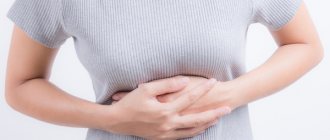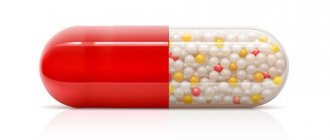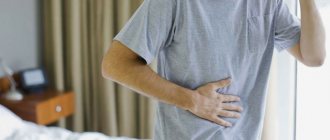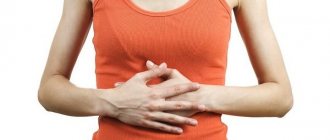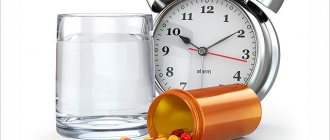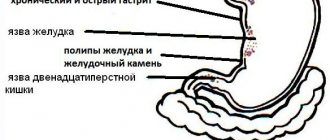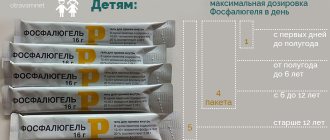Medicines for stomach pain should be taken only after the cause has been determined. The first question that needs to be answered in order to choose the right remedy for the stomach is: does it really hurt? If there is no doubt about the origin of the pain, you should find out the reasons for its occurrence.
How can you determine where your stomach is located?
Draw a conventional horizontal line through the navel. The stomach will be located above it. Approximately 2/3 of its parts are located in the left hypochondrium, the remaining part is in the epigastric region (under the costal arch of the chest). Therefore, stomach pain is most often felt in the area of the 4th intercostal space on the left.
Figure 1 - When your stomach hurts, you need to find out whether the stomach is to blame
Main causes of stomach pain
The need to take syrups or tablets for stomach pain most often results from:
- unhealthy diet - regularly skipping meals, eating dry food, overeating, fasting, alcohol abuse, eating sour, spicy food on an empty stomach;
- poisoning with low-quality products, inedible substances;
- cholecystitis - inflammation of the gallbladder, stones in it;
- pancreatitis - inflammation of the pancreas;
- gastritis, diverticulitis - inflammatory diseases of the gastric mucosa;
- stomach ulcer, duodenal ulcer;
- gastroesophageal reflux - the valve that separates the esophagus from the stomach does not work correctly, resulting in digested food being thrown into the esophagus;
- parasites – cause intoxication of the body, which is manifested by vomiting, nausea, bloating, etc.;
- intolerance to gluten, lactose, and other substances;
- prolonged stress.
Figure 2 - About 10% of stomach pain is caused by an ulcer
What diseases can there be if there is pain and pressure in the abdomen?
The main reason for the appearance of painful symptoms in the abdomen is the influence of irritants on the mucous membranes and walls of internal organs. These parts of the human body react especially painfully to various negative factors. The most common provocateurs of pressing pain are:
— food and toxic poisoning;
— snacks “on the go”;
— the predominance of unhealthy food in the diet, especially processed foods and fast food;
- excessive physical activity;
- regular severe stress;
- frequent consumption of food, the composition of which aggressively affects the mucous membranes of the stomach and intestines;
- smoking, in particular - on an empty stomach and in long intervals between meals;
- presence of tumor neoplasms (both benign and malignant).
If the pain is localized in the solar plexus area, it may be caused by:
- various allergic reactions;
- infectious and viral diseases of the respiratory system, such as sore throat or pneumonia. In many cases, this symptom is not a direct sign of the disease, but occurs as a reaction of the body to antibacterial drugs taken;
- acute appendicitis - begins as a muscle spasm in the abdominal cavity, usually occurs near the navel, then moves to the right and down;
- polyposis;
- spasms or hernia of the diaphragm;
- ulcerative processes;
- inflammation of the stomach, duodenum or other organs located in close proximity to the stomach.
How does it hurt?
The pain can be aching, sharp, dull, bursting, squeezing, cutting, stabbing, pulling.
| Nature of pain | Possible diseases |
| Sudden acute | Cholecystitis, pancreatitis, duodenal ulcer |
| Sudden sharp | Poisoning, chemical burn of mucous membrane, perforation of ulcer |
| Dull aching | Chronic gastritis, initial stage of ulcer. With gastritis, pain appears on an empty stomach and immediately after eating |
| Dull aching, turning into a burning sensation | Acute gastritis, ulcer |
| Spasms, contractions (most often at night or after eating) | Inflammation of the duodenum, ulcer |
| Mild aching pain that does not disappear for a long time | Polyp, malignant formation |
| Severe pain, contractions | Gastrointestinal infections |
| Severe pain in the upper abdomen that lessens over time but does not go away completely | Diseases of the large intestine (eg, colitis) |
| Severe pain in the navel area that moves to the right and up | Appendicitis |
A short-term “shooting” pain that is felt after a sudden movement or when inhaling indicates a spasm of the diaphragm. In this case, the stomach may not be to blame - such sensations are characteristic of circulatory disorders and inflammatory processes. Therefore, medications for stomach pain are likely to be ineffective.
Figure 3 - The nature of pain is important for diagnosis
To accurately make a diagnosis and prescribe effective treatment, a description of the pain is not enough. You need to undergo a series of tests, for example, for the presence of Helicobacter pylori (the bacterium that causes stomach ulcers), as well as ultrasound, FGDS. That is why you should ask not a pharmacist, but a gastroenterologist, what to drink for stomach pain.
Under no circumstances should you endure stomach pain or suppress it with medications without a doctor’s prescription. Painful sensations are a signal that something is already going wrong in the body, and urgent professional intervention in its functioning is necessary.
How to determine the cause of pressing pain in the abdomen, tests and diagnosis
A single colic in the stomach of a compressive nature, after which no other signs of discomfort are observed, is most likely associated with a malfunction in the digestive processes. If after such an attack the pressing pain in the abdomen does not recur, there is no reason to worry. If the compressive pain in the stomach area has become periodic, to identify its cause, you should go to a medical facility, take tests and undergo an examination prescribed by a doctor. To establish a diagnosis, based on a survey of the patient and the results of the examination, the doctor prescribes the necessary tests and procedures. Therefore, it is very important to describe to the specialist in as much detail as possible the location of the pain, its nature and intensity, duration and frequency, and the presence of other uncomfortable symptoms.
Among the diagnostic procedures to identify the causes of compressive pain in the stomach area, the most common are:
1 Ultrasound examination of the stomach, and, if necessary, the intestines or pancreas.
2 X-ray of the stomach.
3 Endoscopy (stomach probing).
4 Analysis to determine the level of acidity of gastric juice.
Medicines for stomach pain that you can take while waiting for the doctor
It happens that the pain in the stomach becomes unbearable, and you still have to take some kind of pill. This should be done as a last resort, since taking the drug can distort the picture of the disease and give grounds for an incorrect diagnosis. In general, doctors allow you to take:
- analgesic - medications that temporarily relieve pain, for example, analgin. At the same time, the situation in the stomach does not change, and there is no need to delay visiting a doctor;
- antispasmodic - drugs that stimulate the smooth muscles of internal organs: Papaverine, No-Shpa, Duspatalin, Trimedat. As a result, the passage of food and gases is facilitated, and muscle spasms disappear.
If you have stomach pain, it is better not to take pills immediately before seeing a doctor. To help quickly make the correct diagnosis and prescribe treatment, prepare the following information:
Figure 4 - Suspensions and tablets for stomach pain should not be used before examination by a doctor
- the circumstances of the pain (before, during, after eating, what you ate, drank, or how long you didn’t eat or drink, whether there were abdominal injuries, blows, stress);
- other symptoms: nausea, bloating, foul-smelling gas, rash, vomiting, heartburn, dizziness, diarrhea/constipation, change in the consistency and color of stool, blood, mucus in the stool;
- did you take medications for stomach pain before applying, what are you currently taking for other diseases;
- What changes have you had in your health status recently?
Try to move less, do not eat and, if possible, do not drink. You cannot give enemas or take laxatives.
Note! Never use a hot heating pad or other heat. Sometimes this does help reduce pain, but it increases inflammation, bleeding and pus formation. Such self-medication can be life-threatening.
Figure 5 - If you have stomach pain, you should not use a heating pad
In what dosage forms are stomach medications available?
Medicines for the stomach are available in the form of tablets, syrups, suspensions and powders, which should be dissolved in juice or water. Some drugs are available in different dosage forms. It depends on their purpose and characteristics of the action. For example, enveloping and adsorbing drugs (Almagel, Maalox, Phosphalugel, Gaviscon) are produced in the form of a suspension, and children's drugs are in the form of syrup.
Medicines for stomach pain in tablets:
- analgesics;
- antacids;
- proton pump blockers;
- astringents;
- gastroprotectors;
- combination drugs;
- antispasmodics.
General information
Burning sensation, like pain, is an important diagnostic symptom. A burning sensation in the stomach most often occurs in the initial stages of gastritis or peptic ulcer .
The symptom can be relieved with medication, because prolonged burning can lead to cancer. Unregulated loads on the digestive system lead to changes in acidity, disruption of the glandular tissues of the stomach and their integrity. When the “stomach is on fire,” in contrast to heartburn , it does not burn in the upper parts of the larynx (as a result of reflux disease and involuntary reflux of food into the esophagus), but discomfort is felt somewhat lower - in the epigastric region. Despite the different etiologies, their treatment is similar.
What to drink for your stomach?
What exactly to drink for stomach pain depends on the diagnosis:
- for gastritis: Smecta, Almagel - to restore the gastric mucosa and against diarrhea, to relieve inflammation - Iberogast, to eliminate spasms - No-Shpa, Cerucal, to correct the enzyme composition of the medium - Mezim, Digestal;
- for cholecystitis, gallstones: Allochol, Gepabene;
- in case of poisoning: sorbents Enterosgel, Lactofiltrum, Activated or White carbon, Smecta. Analgesics will also help get rid of stomach pain in the initial stages of the disease: Analgin, Baralgin.
- for high acidity: antacids Gaviscon, Rennie, Maalox;
- for ulcers: wound healing - Methyluracil, Actovegin, to suppress Helicobacter pylori - Ampicillin, Pilobact-Neo, proton pump blockers Omez, Omeprazole, Nexium, other drugs for complex treatment, selected individually based on test results.
A number of medications for heartburn and stomach pain are useful in a variety of situations. For example, Smecta can be taken for stomach pain caused by eating disorders, heartburn, bloating, acute or chronic diarrhea, gastritis, stomach and duodenal ulcers, colitis.
Many medicines have analogues. For example, to relieve spasms of the smooth muscles of internal organs, you can buy No-Shpu or Drotaverine. The main active ingredient of these drugs is the same – drotaverine. However, if you pay about $1 for 30 tablets of Drotaverine, then for the same number of yellow tablets called No-Shpa - about $2.
Pathogenesis
The burning sensation is accompanied by irritation and injury to the mucous membranes due to increased acidity of gastric juice, peptic enzyme activity and the formation of ulcers. It can “burn with fire” when a person is very hungry and acidic gastric juice reaches erosive areas.
Irritation of the mucous membranes can occur not only due to acidic gastric contents, but in more rare cases it is caused by alkaline reflux . In this case, the mucous membranes are exposed to the action of bile acids , which enter the stomach through the duodenogastric reverse flow of bile.
The pathological process begins with an imbalance in the ratio of “aggressive” and “protective” factors of the digestive system. The main aggressive effect is to increase the activity of proteolytic enzymes and the level of acidity secreted by gastric juice, along with a deterioration in the motility of the digestive organs. Protective properties are reduced if:
- less mucus is produced;
- the processes of natural physiological regeneration of the epithelial surface slow down;
- local blood circulation, innervation and trophism are disrupted.
For example, this can occur under conditions of prolonged or repeated psycho-emotional stress against a background of negative emotions.
A separate predisposing factor, along with heredity and family history, are deficiencies in diet and nutrition, smoking and alcohol abuse.
The pathological process is based on proteolytic destruction of tissue by gastric juice in an area with deteriorated trophism, which is most often observed in the lower parts of the stomach. A decrease in the alkaline component and prolonged contact with acidic gastric juice is possible with spasm of the gastric sphincter - the pylorus. In addition, the level of mucin contained in mucus, the state of the apical membranes of enterocytes, and nervous and vascular trophism are important .
When the mucous barrier and the protein-lipid complex of the apical membranes are destroyed, reverse diffusion of hydrogen ions into the cell membranes occurs, which activates the kinin-kallikrein inflammatory system and increases the permeability of the capillary network. This leads to microcirculation disorder, then lipid peroxidation products as a result of oxidative degradation of lipids under the influence of free radicals, damaging lysosomes.
The negative neuro-emotional effect on the gastrointestinal tract is carried out through the anterior parts of the hypothalamus , along the path of the vagus nerve, acetylcholine, histamine and gastrin receptors in glandular tissues. The formation of acid and the proteolytic activity of the gastric glands increases under the influence of thyroid-stimulating and adrenocorticotropic hormone - the glucocorticoid effect of the adrenal glands increases and the mineralcorticoid effect of the adrenal glands decreases, the production of hydrochloric acid is stimulated and the protective and reparative properties of the mucous membranes of the stomach and intestinal tract are reduced.
Local protective mechanisms are implemented by mucoid cells that produce glycoproteins , sialoproteins and fucopolyproteins , as well as mucus coming from the oral cavity. It is alkaline and can neutralize hydrochloric acid (HCl). In general, the gastrointestinal tract is a very vulnerable system of the body, but it has good regenerative abilities.
Which is better - Gaviscon or Almagel?
The effect of both of these gels for stomach pain is that they form a dense barrier (film) that envelops the gastric contents and is not absorbed during digestion. This protects the inflamed stomach walls from the effects of acid. At the same time, the composition of the gastric juice itself does not change, and food digestion occurs in full. The gel-like film also protects the esophagus if stomach contents are thrown into it, preventing heartburn and inflammation. To get rid of stomach pain, these gels or suspensions should be taken after meals without drinking water. The dose of the drug lasts approximately 4 hours. The cost of both drugs, depending on the offers of pharmacy chains, differs by literally $0.3–0.5.
Figure 6 - A number of drugs for stomach pain have a similar effect
You should make a choice based on your health status, side effects and the composition of the drugs. For example, Gaviscon is allowed for pregnant women to take, but Almagel is not recommended because the necessary studies have not been conducted on it. Therefore, the right to make the final decision on prescribing the drug is transferred to the doctor, who will weigh the benefits for the mother and the likelihood of harm to the fetus.
Heaviness in the stomach after eating, why there is pressure or squeezing after eating, reasons
A feeling of tightness in the stomach or another part of the abdomen can affect both sick and completely healthy people. The occurrence of stomach pain of this nature is most often associated with the quality of food consumed on the eve of the onset of illness, or stress suffered. However, the occurrence of a squeezing feeling in the stomach can signal the onset of diseases of the digestive system. If you begin to pull near your stomach after eating, this may indicate the development of lazy stomach syndrome. This nagging pain is associated with a deficiency of a number of enzymes necessary for the normal functioning of the pancreas. This ailment has a significant impact on the digestive process and often causes the onset of alarming symptoms. It is noteworthy that lazy stomach syndrome is caused by taking certain medications.
Unpleasant symptoms and pressing pain in the lower abdomen, when there is pressure and pain on the left and right sides of the abdomen, are often provoked by a late dinner and a quick go to bed after it. In this regard, it is recommended to have dinner at least a few hours before bedtime. The evening meal should not be too high in calories or difficult to digest. Therefore, at dinner you should avoid foods that take several hours for the stomach to process. Note that heaviness in the stomach is a common condition for people who have the habit of washing down what they eat. It is not recommended to drink food while eating or immediately after it is finished due to the fact that in this way gastric juice is washed out, it becomes insufficient to digest the food in the stomach. This becomes a catalyzing factor for the development of diseases of the digestive system and the fundamental impetus for the occurrence of colic and heaviness in the abdomen.
What tablets for stomach pain can be used during pregnancy?
Pregnancy significantly narrows the list of medications for stomach pain that a doctor can prescribe to a patient. Most often, pregnant women experience heartburn, which has physiological causes. Since the stomach is a hollow organ, the growing uterus compresses it the most. This is especially noticeable in the third trimester. Such heartburn is treated symptomatically - you can take Smecta, Rennie, and other antacid drugs.
Figure 7 - Many medications for stomach pain are contraindicated during pregnancy
In more complex cases, when a pregnant woman is diagnosed with gastritis, ulcers, cholecystitis or pancreatitis, treatment regimens are drawn up by doctors. In this case, the risk to the fetus is compared with the benefit to the mother. If the disease can be “preserved,” maintenance medications are prescribed, and the main treatment is transferred to the postpartum period. In any case, there is no need to panic: new remedies for stomach pain with wide areas of application are constantly being developed.
Diet for burning stomach
Diet for heartburn
- Efficacy: therapeutic effect after 10 days
- Timing: constantly
- Cost of food: 1350-1450 rubles per week
Diet is a fundamental factor in solving digestive problems. You must follow a strict diet and dietary restrictions. Avoid carbonated drinks, alcohol, everything fatty, fried, smoked, canned and spicy. It is necessary to give up baking and snacking on unhealthy foods such as crackers, chips, fast food, etc.
Food should be predominantly boiled and steamed foods, with a minimum of spices. You can even eat pureed vegetables and fruits, this will help reduce the load on the gastrointestinal tract.



